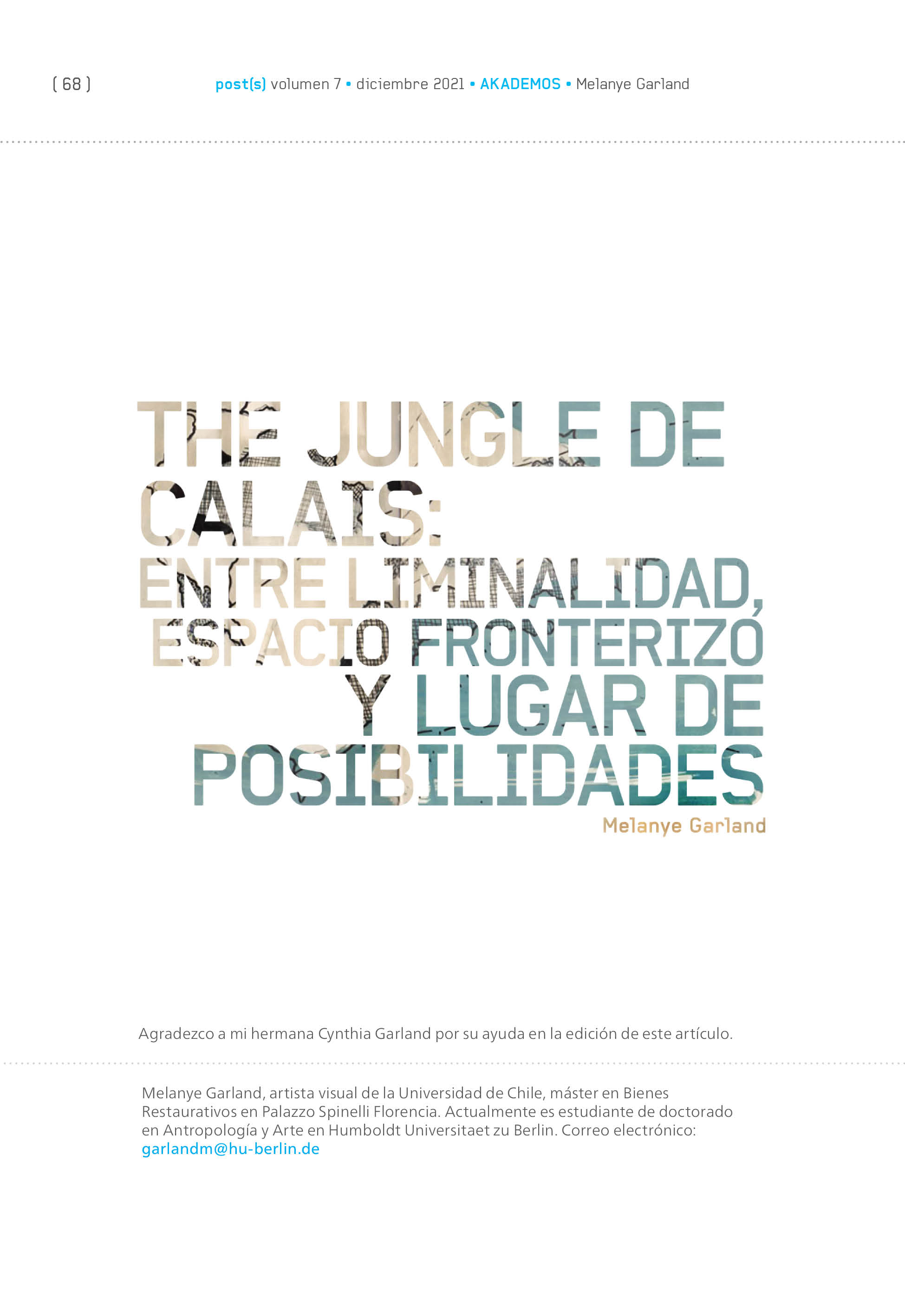The Jungle of Calais: Between Liminality, Borderland, and place of possibilities

Published 2021-11-15
Keywords
- Liminality,
- The Jungle,
- (post)colonial,
- decolonial,
- artistic methodologies
- ethnographic poetry ...More
How to Cite
Abstract
This essay is based exclusively on artistic and pseudo ethnographic research of The Jungle migrant camp in 2016 in the city of Calais/France at the maritime border with England. Through my experience in situ, described through artistic methodologies and poetic writings, I embraced the concept of liminality from a border perspective, going through postcolonial actions and attitudes within the conceptual liminality framework and its transformative, destructive, constructive and In-betweenness characteristics that this ritualistic process entails. From my perspective as an artist and future anthropologist, I am interested in highlighting local frontier narratives that need to be present in our reflection for a more supportive, collaborative and communitarian future, decolonizing our way of perceiving "peripheral" places and contemporary borderland, incor-
porating them as active agents in the city"™ s development.
Downloads
References
- Agamben, G. (2000). Beyond Human Rights. University of Minnesota Press.
- Agamben, G. (2005). State of exception. University of Chicago Press.
- Alves, M. (2017). Decolonizing Brazil. Texto parte de la exhibición Descolonizando o Brasil at SESC Sorocaba. http://www.mariatherezaalves.org/works/decolonizing-brazil-descolonizando-o-brasil
- Auge, M. (1992). Non- places, introduction to an anthropology of supermodernity. Verso.
- Andrews, H., y Roberts, L. (Eds.). (2011). Liminal Landscapes, Travel, experience and spaces in-between. Routledge.
- Anzaldúa, G. (1987). Borderlands/ La Frontera: The new Mestiza. Aunt Lute Book Company.
- Agier, M. (2018). The Jungle: Calais"™s camps and migrants. Polity Press.
- Calais Migrant Solidarity. (2011). Calais: This border kills. Documented police violence. Junio de 2009. https://nobordertestblog.files.wordpress.com/2011/09/english-dossier.pdf
- Chambers, I., y Curti, L. (Eds.). (1996). The post-colonial question: Common Skies, Divided Horizons. Routledge.
- De Genova, N. (Ed.). (2017) The Borders of "˜Europe"™: Autonomy of Migration, Tactics of Bordering. Duke University Press.
- Di Cesare, D. (2017). Resident foreigners: A philosophy of migration. Polity Press.
- Escobar, A. (2007). World and Knowledges Otherwise. The Latin American Modernity / Coloniality Research Program. Cultural Studies 21 (2), 179-210.
- Godin, M., Møller Hansen, K., Lounasmaa, A., Squire, C., Zaman, T. (Eds.).(2017) x Pluto Press.
- Grimaldi, G. (2018). The Back Mediterranean: Liminality and the reconfiguration of Afro Europeanness. Open Cultural Studies 3, 414-427.
- Graburn, N., y Nelson, H. (1989). Tourism: The Sacred Journey. En Hosts and Guests: The Anthropology of Tourism, V. Smith, (ed.), 21-36. University of Pennsylvania Press.
- Mignolo, W., y Tlostanova, M. (2006). Theorizing from the Borders: Shifting to Geo- and Body-Politics of Knowledge. European Journal of Social Theory 9 (2), 205-221.
- Mignolo, W. (2000). Local Histories/Global Designs. Princeton University Press.
- Mignolo, W., y Escobar, A. (2010). Globalization and the decolonial option. Routledge.
- Haraway, D. (1988). Situated Knowledges: The Science Question in Feminism and the Privilege of the Partial Perspective. Feminist Studies 14 (3), 575-599.
- Haraway, D. (2008). When the species meet. University of Minnesota Press.
- Hicks, D., y Mallet, S. (2019). Lande: The Calais "˜Jungle"™ and beyond. Bristol University Press.
- Müller, T., y Schlüper, U. (2018). Dynamiken der Jungles Calais und das europäisch-britische Grenzregime. Bordermonitoring.
- Murphy, F. (2018). Refugees and police violence in Calais. Anthropology News 9. https://anthrosource.onlinelibrary.wiley.com/doi/pdf/10.1111/AN.722
- Papadopoulos, D., Stephenson, N., y Tsianos, V. (2008). Escape Routes: Control and Subversion in the Twenty-First Century. Pluto Press.
- Pérez, E. (1999). The decolonial imaginary. Indiana University Press.
- Papadopoulos, D, y Tsianos, V. (2008). The Autonomy of Migration: The Animals of Undocumented Mobility. Palgrave MacMillan.
- Rikou, E., y Yalouri, E. (2018). The Art of Research Practices Between Art and Anthropology. Field Journal. http://field-journal.com/editorial/introduction-the-art-of-research-practices-between-art-and-anthropology
- Refugee Rights Europe. (2016). The unknown knowns: Observations from small informal refugee camps in northern France. Refugee Rights
- Europe. https://resourcecentre.savethechildren.net/document/unknownknowns-observations-small-informal-refugee-camps-northern-france/
- Singh, I., Flores, F., Mohseni, L., y Hansen, S. (2016). Humans of Calais: Migration from the Perspective of Migrants. The King"™s College London Migration Research Group.
- Szakolczai, Á. (2016). Permanent Liminality and Modernity: Analysing the Sacrificial Carnival Through Novels. Routledge.
- Sanyal, D. (2017). Calais"™s "˜Jungle"™: Refugees, Biopolitics, and the Arts of Resistance. En V. Agnew, K. Konuk y J.. Newman (Eds.), Refugee Routes, 159-192. Bielefeld: transcript Verlag.
- Simmel, G. (1917). Grundfragen der Soziologie. Facsimile Press.
- Thomassen, B. (2010). "˜Second generation immigrants"™ or "˜Italians with immigrant parents"™ ? Italian and European Perspectives on Immigrants and their Children. Bulletin of Italian Politics 2 (1), 21-44.
- Thomassen, B. (2014). Liminality and the modern: Living through the In-Between. Routledge.
- Turner, V. (1967). The forest of symbols: Aspect of Ndembu Ritual. Cornell University Press.
- Turner, V., Abrahams R., y Harries, A. (1969). The Ritual Process: Structure and Anti-Structure. Routledge.
- Turner, S. (2015). What is a refugee camp? Explorations of the limits and effects of the camp"™. Journal of Refugee Studies 29 (2).
- Van Gennep, A. (1960). The Rites de Passage. University of Chicago Press.
